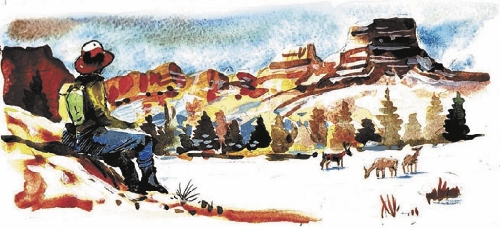Zion in winter offers much more solitude

Open all year, Zion National Park in southwestern Utah is a park for all seasons and attracted nearly 2.7 million visitors last year. To experience Zion with a little solitude, visit during the offseason. The pulse of life slows for Zion in winter. Typically, about 70,000 visitors come to Zion each month from December through February, compared with nearly 300,000 in April. Visitation increases to about 360,000 each month through spring, summer and into fall.
Zion is about 170 miles from Las Vegas, using Interstate 15 north through St. George, Utah, to Highway 9, the park access road through Hurricane and several charming pioneer-era towns along the Virgin River. The largest of these communities, Springdale, offers tourist services, including restaurants and many places to stay near the park’s main entrance. Expect to pay a $25 park entrance fee, unless you have a federal recreation pass. Visitors touring the park in oversized vehicles must pay an additional fee to use the Zion-Mount Carmel Tunnel.
Winter restricts some activities enjoyed by Zion visitors the rest of the year. Deep snows in Zion’s high elevations close many trails, backcountry access roads and one small high-country campground. The Human History Museum closes from the end of October until April, but interpretative exhibits at the Zion Canyon Visitor Center and the Kolob Canyons Visitor Center remain open during winter. The trail horses used on popular horseback rides head for winter quarters and a vacation, but the foot trails they follow in the main canyon, as well as miles of other trails, remain open for hikers.
The shuttle system shuts down after October, except for weekends in November. However, the scenic drive into Zion Canyon, accessible only by shuttle April through October, re-opens to private vehicles in winter. Winter visitors driving their own vehicles usually find plenty of parking at viewpoints in the main canyon. These parking areas near the Virgin River and trail heads are normally crowded with tour buses and shuttles the rest of the year.
Zion National Park accommodates tent campers and RV users in two large facilities, South Campground with 126 units and Watchman Campground with 185 units, both costing $16 per night. RV electrical hookups are available at Watchman for $18 per night. Most of the year, Watchman campsites are available only with reservations and sites near the river cost more, while South Campground sites are available on a first-come basis. In winter, park officials close South Campground and keep Watchman open without reservations at the same charge for all campsites.
Stately Zion Lodge welcomes guests all year, but in winter, room rates may be lower. Originally built in the 1920s, the handsome lodge of stone and wood seemed appropriate to its surroundings. When a fire devastated the mail building in 1966, hasty reconstruction altered the old building’s rustic appearance. A reconstruction project in 1990 used old photos and plans to restore the lodge’s exterior. Operated by Xanterra Parks and Resorts, a Park Service concessionaire, the lodge offers both historic cabins and modern motel-style accommodations with a restaurant, gift shop and other amenities in a woodland setting. Make reservations with Xanterra online or call (866) 315-2980.
The same winter snows that blanket Zion’s high country drive many of the park’s animals into lower elevations. With leaves stripped from vegetation, winter visitors driving park roads or hiking along trails are much more likely to spot herds of deer and other wildlife. Although many kinds of wildlife sleep the winter months away, larger creatures and the park’s many resident birds may be spotted.
When snows frost Zion’s beautiful cliffs, creating calendar scenes in every direction, nearly all visitors become avid photographers. Frost creates frozen miniature waterfalls at places where seeps squeeze out between layers of stone. Although the river runs with sufficient volume to keep moving, the still waters along its banks often freeze, trapping the colorful leaves of autumn.
Margo Bartlett Pesek’s column appears Sundays.